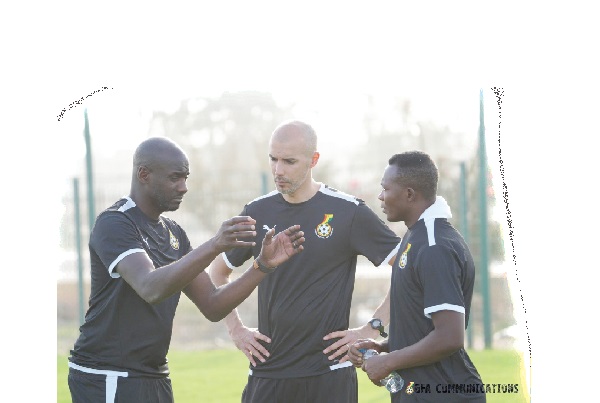
Cost of firing Otto Addo: GFA and government weigh up high-stakes decision
The fate of Black Stars head coach Otto Addo hangs in the balance as the Ghana Football Association (GFA) contemplates his future amid widespread public dissatisfaction and a deepening financial conundrum.
The decision to retain or dismiss the coach has been deferred, pending consultations with key stakeholders, including the government, whose financial backing is critical for national team operations.
Ghana’s failure to qualify for the 2025 Africa Cup of Nations (AFCON) for the first time in two decades has left the GFA’s Executive Council sharply divided.
While some council members argue that Otto Addo has failed to meet key performance indicators (KPIs) and lacks the strategic vision to lead the team forward, others caution against the growing instability caused by frequent coaching changes.
For now, the GFA appears set to delay any decisive action until after the general election, with the Minister of Youth and Sports, Mustapha Ussif, and other top officials preoccupied with Parliamentary elections.
The broader financial implications of dismissing the coach and his team—barely nine months into a three-year contract—are significant and require government approval.
History of costly decisions
This is not the first time the GFA and the government have faced such a financial dilemma. Since 2021, Ghana has dismissed four national team coaches—Charles Akonnor, Milovan Rajevac, and Chris Hughton among them—at considerable expense. Serbian coach Rajevac’s dismissal following Ghana’s disappointing first-round exit at the 2021 AFCON in Cameroun cost the country $117,000 in compensation.
Similar settlements for other coaches, including Akonnor, whose $100,000 package remains unpaid in full, have compounded the financial strain. According to GFA spokesperson Henry Asante, such decisions come with steep consequences.
Speaking on Accra’s Asaase Radio, he emphasised the caution required when contemplating yet another managerial change.
“The truth is that sacking a coach before the expiry of their contract comes with financial consequences. After we dismissed Milo [Rajevac], he took the case to FIFA and won.
The Ministry of Youth and Sports couldn’t meet the $100,000 obligation, so the FA had to pay $117,000 to avoid sanctions. C.K. Akonnor’s compensation is still outstanding, and we have a similar issue with Chris Hughton, who was dismissed earlier this year,” Asante explained.
Otto Addo equation
Otto Addo’s dismissal would likely demand another hefty settlement, as the GFA had to buy him out of his contract with Bundesliga giants Borussia Dortmund to secure his services.
A GFA insider disclosed that the financial implications of terminating his contract prematurely would be immense, particularly at a time when the government is still grappling with past compensation claims.
Despite these challenges, Addo’s tenure has been far from satisfactory. Ghana finished bottom of their AFCON qualifying group, failing to secure a single win in six matches against Niger, Angola, and Sudan.
Public outrage has intensified, with critics questioning the coach’s ability to galvanise the team.
Kojo Addae-Mensah, CEO of Databank Financial Services and a member of the recruitment team that brought Addo on board, was unequivocal in his criticism.
“Otto’s second coming has not worked out the way we expected. The GFA must be bold and let him go, regardless of the financial consequences. Ghana must find the resources to hire a top-class coach, someone like Herve Renard, who has proven success at the AFCON level,” Addae-Mensah said.
Voices of moderation
Not everyone within the GFA is convinced that firing Otto Addo is the solution. Some moderates argue that constant managerial upheaval has undermined the team’s stability and progress.
They suggest giving Otto Addo another chance to rectify his mistakes, especially as the national team’s technical shortcomings were glaring during the AFCON qualifiers.
“There is a troubling pattern of frequent coaching changes that have failed to deliver results. Otto has taken responsibility for the team’s poor performance and has identified areas for improvement. Dismissing him now might not be the wisest course of action,” a GFA insider revealed.
Otto Addo reportedly enjoys the backing of many players and former national stars and coaches, Laryea Kingston and Ibrahim Tanko, who have cautioned against yet another managerial shake-up.
Strategic risks ahead
Beyond the financial implications, timing poses another significant challenge. With Ghana’s next FIFA World Cup qualifiers scheduled to begin in March, any new coach would have little opportunity to assess the squad or build a cohesive team through international friendlies.
This uncertainty further complicates the decision-making process for the GFA. “There’s no guarantee a new coach would fare better.
And if Ghana fails to qualify for the 2026 World Cup under a new coach, what then?” questioned an insider, highlighting the precarious nature of such a gamble.
Government’s crucial role
Ultimately, the government’s role in this high-stakes decision cannot be overstated.
As the primary financier of the national team’s activities, its approval will be pivotal in determining whether Otto Addo stays or goes.
For now, financial prudence appears to be the guiding principle, as the government and GFA weigh the potential fallout of yet another managerial overhaul.
The GFA faces a monumental choice that will not only shape the future of the Black Stars but also have far-reaching financial implications.
Whether Otto Addo remains at the helm or a new coach takes over, the decision must balance public demand for accountability with the realities of Ghana’s strained financial resources.